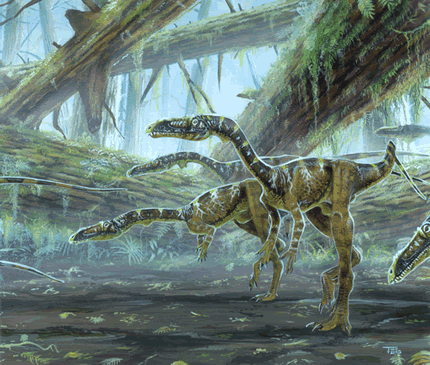Coelophysis bauri - North American Dinosaurs
Homepage > North American Dinosaurs - Coelophysis bauri
(see-loh-fie-siss)
"hollow form"
Describer Cope, 1887
Also Known As --
Type of Species bauri
Order Saurischia
SubOrder Theropoda
InfraOrder --
Micro-Order --
SuperFamily --
Family Coelophysidae
SubFamily --
Size 10 feet (3 meters) long
Period Late Triassic, 220 million years ago
Fossilsite New Mexico, Utah, Arizona
Diet Carnivore
Coelophysis lived during the Late Triassic Period 220 million years ago in what is now North America. Coelophysis was a small dinosaur, built for speed and agility. Standing about 6.5 feet (2 meters) tall, had powerful, long hind legs, and a slender body made it a fast and deadly predator.
Coelophysis had a long narrow skull, with large eyes and an elongated snout packed with small, sharp teeth. Its front legs were small and were used for grasping and securing its food. Interesting Fact [Coelophysis' leg bones were nearly hollow. The hollow bones kept its weight down allowing the dinosaur to use most of its energy for speed. From these hollow bones, Coelophysis gets its name "hollow form".]
Scientists believe that Coelophysis was a pack animal hunting in groups. Some fossil finds indicate that this dinosaur was a cannibal that ate its own young. This observation is made from the findings of some adult skeletons which contained bones of a baby Coelophysis inside their rib cages. However, its main source of food was probably meat from other animals, including fish. This dinosaur is one of the oldest in North America.
Discovery
In 1889, Edward D. Cope an American paleontologist, announced the discovery
of a new dinosaur, which he named Coelophysis. The first discovery was
of an incomplete skeleton. The first complete skeleton of Coelophysis
was discovered in 1947. Hundreds of complete and incomplete skeletons
have been found in Ghost Ranch, New Mexico. It suggests that they may
have died in a great flood. From all these findings, Coelophysis is one
of the world's best known dinosaurs.

Image courtesy of Todd Marshall